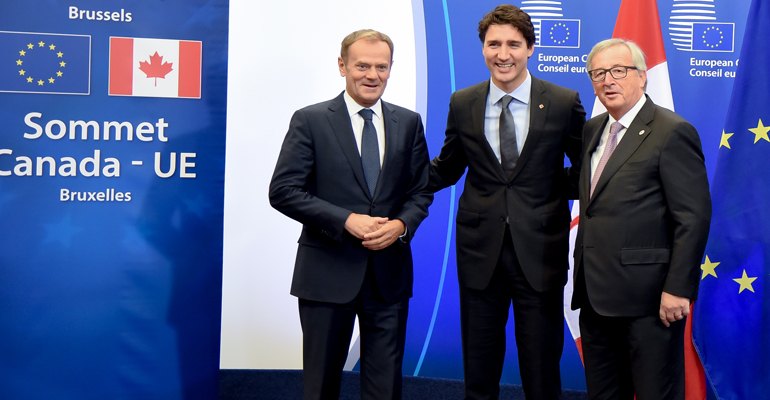Today, the President of the European Commission Jean-Claude Juncker, President of the European Council Donald Tusk, Prime Minister of Slovakia Robert Fico, and Canadian Prime Minister Justin Trudeau signed the Comprehensive Economic and Trade Agreement (CETA) between the EU and Canada.

According to a statement, the deal will benefit exporters, big and small, creating opportunities for European and Canadian companies and their employees, as well as for consumers. Almost all – 99 percent – of import duties will be eliminated, saving European exporters of industrial goods and agricultural products over EUR 500 million annually.
Dubbed the EU’s most advanced and progressive trade agreements to date, CETA is a landmark accord that sets the benchmark for future agreements. It includes the most ambitious chapters on sustainable development, labour and the environment ever agreed upon in bilateral trade agreements. CETA will not solely help boost trade and economic activity, but also promote and protect shared values.
– This is how we can shape globalisation – through progressive, state-of-the-art trade agreements that uphold our values and set new standards for global commerce. Through our agreement with Canada, we build a bridge to one of our closest allies, making a real impact for our exporters, entrepreneurs and employees. Trade simply works, and we know it from experience. When we get rid of unnecessary costs and overlapping bureaucracy, companies will try out new markets and hire more people, said Cecilia Malmström, European Commissioner for Trade.
Access to public tenders
CETA will also end limitations in access to public procurement, making it possible for EU firms to bid for public contracts – at the federal level as well as in Canada’s provinces, regions and cities. CETA will open up the services market, making it easier for professionals such as engineers, accountants and architects to work in Canada.
Food and agriculture
For EU farmers and food producers CETA opens up new opportunities while fully protecting the “sensitivities” of the EU. The EU’s openings on certain products are limited and calibrated balanced out by Canadian openings that satisfy important European exporting interests, such as cheese, wine and spirits, fruit and vegetables, processed products and “Geographical Indications”. The special status of the latter Canada recognises, agreeing to protect a list of more than 140 European goods in Canada, such as Prosciutto di Parma and Schwarzwälder Schinken.
A range of goods will have fewer administrative hurdles, avoiding double-testing on both sides of the Atlantic, benefitting smaller companies in particular. The EU’s 500 million consumers are also set to benefit from CETA while current EU standards and regulations remain in play. Only products and services that fully respect all EU regulations will be able to enter the EU market. This means that CETA will not change the way the EU regulates food safety, including GMO products or the ban on hormone-treated beef.
New dispute settlement mechanism
The current form of investor-state dispute settlement (ISDS) that exists in many bilateral trade agreements negotiated by EU governments, has been replaced with a new and improved Investment Court System (ICS). The new mechanism will be a public one and not based on ad hoc tribunals. This reform means that investors can be protected from discrimination in a narrow number of cases, but in a manner which does not leave any room for concern on the right of states to regulate in the public interest.
The procedures of the Investment Court will be transparent and its judges appointed by the EU and Canada. The Commission is committed to completing and refining the reform of investment dispute resolution and the discussions of the past few weeks and days have helped shape that commitment.
Member States (MS) will continue to be able to organise public services like healthcare and education as they wish. This and other issues have been further clarified in a Joint Interpretative Instrument that will have legal force and that clearly and unambiguously outlines what Canada and the EU have agreed in a number of CETA articles.
What happens next?
After signature, the European Parliament (EP) must give its consent to CETA for it to enter into force provisionally. Provisional application, once an agreement has been approved by MS in the European Council (EC) and by the EP, allows European businesses and consumers to reap the benefits of the agreement early on.
Since the ICS is a new issue in trade agreements and the public debate on it is not finished in many countries, the choice of EU MS – supported by the Commission – is that ICS will be out of the scope of the provisional application of CETA. This means that it will only be implemented once all MS conclude their national ratification procedures.
During this time, the Commission will work with Canada to further elaborate some of the parameters of the new system, like the selection of judges, the access by smaller businesses to the new system and the appeal mechanism.
5564/AS


